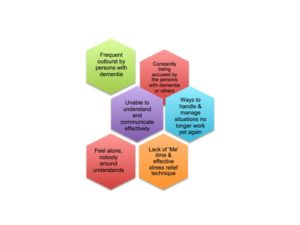4 Ways to Maintain Sanity for Caregivers for Persons With Dementia

In a not-so-nice tone, telling the persons with dementia:
“Talk so much. Why do you always talk about the past? The past is over. Why can’t you talk about something recent?”
“Why are you so loh-soh (long-winded in hokkien), keep talking about the same thing over and over again?”
“You have just eaten, and now you are asking for food again? I think you are gila (crazy in Malay).”
“You have just eaten, and how dare you told them that you haven’t eaten for the whole day! You are trying to create trouble for me, is it?”
“I have much more money that you have. How many times do I have to tell you that I didn’t steal your money? Anyway, how much money do you have for me to steal, huh?”
“How odd that you are unable to remember anything but you can remember me taking your money! You just want to accuse me and make me look bad in front of our relatives, right?”
Sounds familiar? Taking care of someone with dementia can be a frustrating and emotionally draining experience. Many caregivers whom I came across shared their frustrations, stating how tired and drained. Some common causes included:

Prolonged repetition of the above causes will inevitably results in highly stressed-out and burnout caregivers. Persons with dementia are quick to pick up emotion cues from their caregivers and likely to mirror those emotions, resulting in what we commonly called the ‘challenging behaviours’ or even aggression.
BLAA, BLAA black sheep do you any wool? … If you are thinking about singing this nursery can help you maintain your sanity… Well, yes and no. Yes, singing nurseries may help some individuals feel better, and no, it’s not the nursery that I want to talk about in this post. I will like to introduce you 4 easy ways to keep your sanity as caregivers for persons with dementia: BLAA, BLAA – Breathe, Laugh, Accept and Adapt.
Caregivers, BLAA, BLAA your way to sanity. Let’s take a look at how to use BLAA BLAA to create that easy, relaxed and calming environment and atmosphere that will effectively reduce those challenging and frustrating behaviours by persons with dementia, hence, help caregivers maintain your sanity in the long-run.
Breathe, take time to breathe and observe your breath. Observing your breath is one simple, easy yet effective practice to calm down. Taking time to slowly and gently breathe in while expanding your abdomen area and breathe out, contracting your abdomen area. Harvard has proven that mindful breathing technique is an effective stress relief technique, and a calming way to lower your heart rate and blood pressure while slowing down your breathing. Mindful breathing should feel relaxing not causing you to feel breathless. However, if you do feel breathless and anxious (heart rate increasing) while practicing ‘mindful breathing’; you may be among the many others using the wrong technique. If you are new to mindful breathing, here are 2 important tips for you:
- Learn the right technique and you will be feeling more calm and relaxed in no time. Click here to subscribe to learn the right technique.
- Start small and easy with 5 mindful breaths twice a day, in addition to as and when you are feeling stressed. Slowly (but surely) increase your practice to 30 seconds in the morning and 30 seconds at night and ultimately to as long as you are able to manage, say 30 minutes or 40 minutes or even more. Hey, do you know that research has shown that mindful breathing is good for your cognition as well not as emotional wellbeing? 😉
Laugh, yes, laughing is an effective way to relieve your stress and tension, and to get out of a tense situation with your loved ones with dementia. As previously mentioned, persons with dementia are highly sensitive to caregivers emotions and are likely to mirror caregivers’ emotions. I’ve learnt that appropriate laughter and jokes is one sure way to ‘cool’ the fiery and tense situations that we got caught in at times when providing care to persons with dementia. Laugh away the fire and tension in those situations. I remember the time when my late-grandmother, who had dementia, had to moved into my mother’s house so that my mother and her helper can take care of the former. My late-grandmother was pretty unwilling and not-at-all excited about having to give up the neighbourhood where she had been living in for years to move into a new neighbourhood at her old age. On the day of her move, we had to shift, adjust and re-adjust the placing of the furniture around the bedroom quite a few times in order to ensure adequate walking space so that she will not trip on them and fall. While we were busy with the placement of the furniture around the room, dripping wet with perspiration, she came into the room voicing out her displeasure by saying (in hokkien) “I told you that I don’t want to move here. Now you have to move the furniture here and there the whole morning. Very fun, is it? Like in a movie huh?” I was taken aback by her (somewhat insensitive) remarks. At that split moment, two thoughts ran through my head:
- We were busy the whole morning and soaked in our perspiration for your safety.
- Susan, laugh it off. She was just upset to uproot from her house and familiarity and move to a new environment at her age.
I chose to respond with #2. I smiled at her and told her in a joking tone, “Yes, Ah Ma, we are in a movie. You are watching us in our movie, so you have to pay $5 for your movie ticket.” I ended by sticking out my palm to her and laughing. She laughed along and slapping my palm lovingly with her fingers. And the tension was resolved. She walked out of the room, no longer feeling upset.
So yes, laughter was useful in easing that tense situation. I guess I could have that split second to choose my response because I have been practicing mindfulness since I was 18. The next time you feel like responding with anger or sarcasm, STOP and choose to LAUGH it off (if appropriate for that situation) instead.
Accept that life will be different, and situations will be different (for some of you, with each passing day). Acceptance is the first step to come to peace with the situation, to find peace and calm in yourself and to maintain your sanity. Refusal to accept that the person with dementia will no longer be the person he/she used to be over time will not and does not change the fact that they will slowly no longer be the person they used to be. Instead of yearning for the person whom he/she used to be, look at and accept him/her as he/she is today at this moment because no amount of yearning can bring that person back. And that yearning will result in more suffering and unrest in your mind. Acceptance is the first step in moving on to a better future in most, if not all, situations. Trust me, I know what I am talking about regarding acceptance and moving on.
Adapt, adapt and adapt. Adapt the environment, tools, equipment and life in general so that the persons with dementia can still use their existing abilities and strengths to live their life to their fullest at this present moment, and give up trying to make them do things that they used to be able to do but are currently beyond their capabilities. It is important to uncover and understand their existing abilities and strengths. They may not be able to read a whole book now but they may still be capable of a discussion about what’s happening. They may not be able to go marketing independently now but they may still be able to cook a dish or two. As they slowly lose their ability to cook independently, cook with them. Involve them in the preparation of the ingredients. Adapt, and change. Keep adapting and changing as change is the ONLY constant in life. As you accept their current limitations, recognize their current abilities and strengths, and adapt whenever necessary, you will find it easier to keep your sanity.